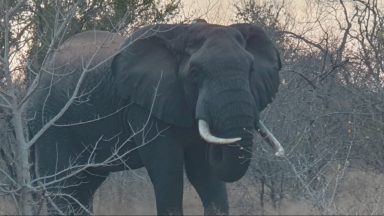Dogs are incredibly useful out in the bush. As expert trackers dogs are proven to be one of the most effective force-multipliers in counter-poaching operations. In 2019, in partnership with Mozambique’s National Administration for Conservation Areas, Peace Parks deployed a canine unit in Limpopo National Park in order to strengthen wildlife protection efforts there. Comprising on and off-leash tracker dogs as well as free-running pack hounds, the canine unit has proved to be invaluable in helping to secure such a vast area with limited resources – the park is over a million square hectares!
AK, Jungle and Nkonzo, are a fifty-fifty doberman/bloodhound cross. The combination of the territorial nature and alertness of the doberman and the keen senses and excellent nature of the Bloodhound makes for an excellent dog for counter-poaching operations. As free-running pack hounds, they are fitted with GPS collars to ensure they can be quickly located and easily followed out in the bush.
Trained to work on and off leash, Fury is 25% doberman and 75% bloodhound. He can take scents up to 24 hours old and easily cover 20 kilometres on an outing. This is incredibly useful when the rangers pick up tracks from poachers that have already left the scene.
Not all dogs are equal, though. Hunter is not a tracking dog, but instead acts as companion to the rangers and camp guard, keeping large game away at night. Hunter loves to play and he loves a sunset.
Whether at work or at play, all the dogs are valued members of the Peace Parks team. The dogs and their handler, Gabriel Mpala, have become critically important members of the security team by contributing to successful security operations. Now, AK, Nkonzo and Jungle are moving to Nyika National Park in Malawi where they will continue their valuable work. There is no doubt that when they are deployed in an area, illegal poaching activities are reduced.

